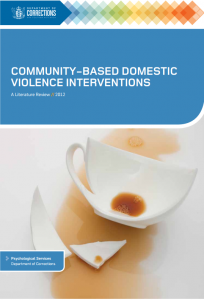
By Marilize Slabber. Registered Clinical Psychologist. Senior Psychologist, Department of Corrections
A useful resource for those working with domestic violence in the community.
There are nine key points of interest:
- This literature and research review looked at the status of domestic violence interventions in Canada, United Kingdom, Australia, United States and New Zealand.
- The domestic violence field is dominated by two approaches. The Domestic Abuse Intervention Project Programme (DAIP or the Duluth Programme) or Cognitive behavioural approaches. It is often difficult to make clear distinctions between the two models as many programmes combine elements of both.
- Programmes in key jurisdictions vary across and/or within countries. Some regions have developed culturally suitable programmes.
- The New Zealand Department of Corrections does not have specialised prison programmes for domestically violent offenders.
- There have been few evaluation studies of domestic violence programmes.
- Overall, the research provides more information on what does not work rather than on effective ways to stop family violence.
- Findings from research on other interventions with general offenders suggest that the most effective interventions are consistent with the principles of risk, needs and responsivity.
- Some groups of domestic violence offenders may have additional needs and/or responsivity issues such as difficulties with motivation, serious mental illness, personality disorders and substance abuse.
- The review noted the weak positive impact on recidivism rates of domestic violence offenders within a risk, needs and responsivity framework.
